Market Dominance Guys
Season 4
Episodes
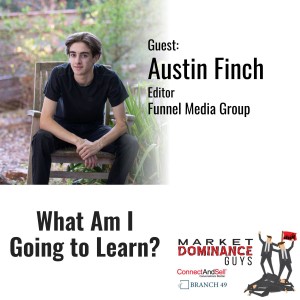
Tuesday Oct 18, 2022
EP152: What Am I Going to Learn?
Tuesday Oct 18, 2022
Tuesday Oct 18, 2022
Most people look at a potential job from the standpoint of “What am I going to earn?” Austin Finch, Funnel Media Group’s podcast editor and today’s guest on Market Dominance Guys, talks with our host, Chris Beall, about an additional and very important way of looking at any new employment you’re considering. They suggest asking yourself the question, “What am I going to learn?” Austin cautions job hunters that even a high-paying job can be a dead-end job. When you’re looking at a new job — whether it’s in sales or another field — Austin suggests that “If you can gain experience, and move on to gain more, then there’s no reason to hold yourself back.” Listen to the whole podcast for more words of career wisdom from Chris and Austin in today’s insightful and helpful Market Dominance Guys’ episode, “What Am I Going to Learn?”
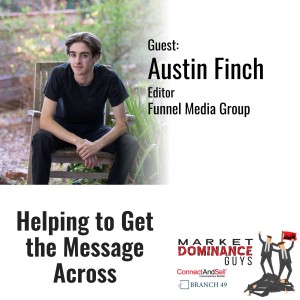
Wednesday Oct 12, 2022
EP151: Helping to Get the Message Across
Wednesday Oct 12, 2022
Wednesday Oct 12, 2022
Who’s behind the curtain making the Market Dominance Guys the great podcast that it is? It’s Austin Finch, an editor at Funnel Media Group, which produces Market Dominance Guys. In listening to this conversation between Austin and our host, Chris Beall, you would never know that Austin is the youngest guest ever interviewed for this podcast. Currently 17 years old, he has edited Market Dominance Guys for several years and has recently added Helen Fanucci’s “Love Your Team” podcast to his editing responsibilities. In talking with this intelligent, thoughtful, and insightful young man, Chris asks about the challenges of podcast editing, including the pruning and grafting necessary to increase a podcast audience’s understanding and to decrease the distractibility caused by any audio glitches or guests’ faux pas. Austin loves his job and sees his editing work as that of a translator for the hosts’ and guests’ messages, and his goal as “Helping to Get the Message Across,” which just happens to be the title of today’s Market Dominance Guys’ episode.
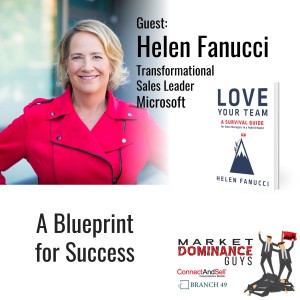
Wednesday Oct 05, 2022
EP150: A Blueprint for Success
Wednesday Oct 05, 2022
Wednesday Oct 05, 2022
Retaining your top talent and delivering results is a challenge for all sales leaders when your top talent can walk out the door without taking a single step.
The hybrid work revolution has made sales management the most pivotal role in the innovation economy—and simultaneously the most challenging. Our guest today is Helen Fanucci, Transformational Sales Leader at Microsoft, with 25 years managing hybrid teams and has an in-depth understanding of the problems facing sales managers today. Our Market Dominance Guys’ host, Chris Beall, conducts this second interview in his two-part conversation with Helen about her new book, Love Your Team: A Survival Guide for Sales Managers in a Hybrid World. In this podcast and in Helen’s book are details on not only what sales managers must be doing to thrive, but how to do them. It’s definitely a quintessential guide — with all the steps you need to know. But it’s even more than that as the title of today’s Market Dominance Guys episode states, it’s “A Blueprint for Success.”
About Our Guest
Helen Fanucci, Transformational Sales Leader at Microsoft is the author of Love Your Team: A Survival Guide for Sales Managers in a Hybrid World, available November 1, 2022.
Full episode transcript below:
(00:21):
Retaining your top talent and delivering results is a challenge for all sales leaders, when your top talent can walk out the door without taking a single step. The hybrid work revolution has made sales management the most pivotal role in today's innovation economy, and simultaneously the most challenging. Our guest today is Helen Fanucci, transformational sales leader at Microsoft, and has 25 years managing hybrid teams and an in-depth understanding of the problems facing sales managers today. Our Market Dominance Guys host, Chris Beall, conducts this second interview in his two-part conversation with Helen about her new book, Love Your Team: A Survival Guide for Sales Managers in a Hybrid World. In this podcast and in Helen's book are details on not only what sales managers must be doing to thrive, but how to do them. It's definitely a quintessential guide with all the steps you need to know, but it's even more than that. As the title of today's Market Dominance Guys episode states, it's a blueprint for success.
Chris Beall (01:25):
You have a team this big, you're going to have this much time spent on these one-on-ones, this much on these. These are the ones that have a fixed agenda. These are the ones that are event-driven, but they're probably going to flow at about this rate. Here's the blah, blah, blah. It's on and on. I mean, it's like an engineering breakdown. And folks, by the way, when you read this book, what you're going to get is love as both an emotional concept but also as an engineering concept. Love your team is something you do, not something you just feel. It's mostly something you do through these one-on-one conversations. There must have been a time in your career where you were going through the evolution of all this and you have all the pressures of regular sales managers, report this, blah, blah, blah, all this stuff, right?
Helen Fanucci (02:13):
Sure. Yeah.
Chris Beall (02:14):
Did you have to go through a transition or were you just like, "No, I'm always going to do it like this. Screw all you people"? Because I think for most people in the audience who want to do this, what they're going to do is they're going to read the book, then they're going to try to apply, say, some of the conversations of connection. I believe they'll probably start there because they're early and they'll notice that they didn't do one to introduce themselves to the team. And you have a great story about somebody quitting because she went to a group and never got engaged with by the audience. But you do have to go through a process of, "Gosh, I got to figure out this time management thing because that's the real constraint." Or is it just like, "I'm Helen Fanucci. I made my way through MIT. I must be able to manage my time"?
Helen Fanucci (02:58):
I had to think about time constraint, for sure. So, I used to do hour-long one-on-ones with my team. This was years ago. And somehow I thought that that's what was needed and maybe at the time that's what was needed. But I do a half-hour, actually 25 minutes now, and this is a new thing since COVID in the last 18 months is going from a half-hour conversation to 25 minutes. Because everybody's back to back and everybody needs at least a five minute break between a 30 minute or 25 minute conversation. So, I do that. Now, the other thing is I'm available on IM. So, one of the things that I talk about actually in the book in the first getting to know your team is how to communicate with me. People IM me or they'll text me, and so I'm also available for drive-by connection points in between our biweekly one-on-one.
(04:01):
So, I do biweekly one-on-ones with direct reports. And so my last team was 12 direct reports. I now have two managers that work for me and then about 30 people in my organization currently. And so I will do quarterly connections or things like that and sometimes more frequently with some of my skip level reports, people who report to the managers that report to me. And then of course, and separate from the one-on-ones, are the formal pipeline reviews. It depends on what is going on. So, it will happen twice a month if there's a hot deal happening and there's a lot of different moving parts or actions needed. It will for sure happen at least once a month. So, there are different requirements for forecasting in different organizations. So, I definitely pay attention to that and do the forecast reviews with my team so that I can be prepared when I need to report out and up to my management.
(05:10):
And one of the things I really emphasize, speaking of forecasting, is delivering three to 5% of the forecast. I don't value diving catches and last-minute deals in a way that maybe traditional sales managers might. Like, "Rah-rah, that is fantastic." Well, what that meant is it's a missed opportunity for us to get additional investments in our business if we didn't forecast that revenue. Because our investments in our business are directly tied to the anticipated and forecasted revenue. So, if we're under-forecasting all the time, we are missing out on a whole bunch of opportunity to actually increase our value to our customers and get more headcount and investments for our team.
Chris Beall (05:58):
I remember reading that in the book and going, "Oh yeah, that's right." As the guy who's on the other side making those investments, if the forecast is sandbagged, it's off, it's short, it's light just to look good, then it's like, "Well, how much are we going to put as a company into achieving that number?" If you take the thought experiment, you tell me you're going to make nothing, what am I going to invest in you? Well, nothing. I got to find somebody else to do the job. I want to switch up a little bit to you experiencing... You didn't just write a book, you actually do it. I've watched you do it now for, I guess, three years. And I've always been kind of surprised.
(06:38):
It's like sales management to me, when I've seen a lot of it, is, "Yeah, I put somebody in a territory, try to get a good rep, put them in a territory, hope they work out, tell them war stories about how great you were back in the day. Fire them if it doesn't work out and they go to club if it does." It's kind of like that's sales management. You have this very systematic step-by-step process or repeatable cycles within the process with these 17 conversations. My guess is that of the 17 conversations, one kind of conversation is the favorite, the one you look forward to it. If it's the first on the calendar in the morning, you get up a little bit earlier and are hyped up for it and ready to go, and you don't want any distractions and away you go.
(07:25):
And then there's always one kind of thing that you know you got to do, but it's not your fave. It's just it's there and you got to make sure you do it and do it well. But it's not the one that you... And I know you. You're going to do both of them. But what is your favorite? The one that really gets you jazzed. You've looked back on it, maybe you want to talk about it over dinner and wine in the evening. And then what's the, you got to do it, it's really important, but I don't love it that much?
Helen Fanucci (07:54):
Okay. So, I'll start with the second first. I don't love performance improvement, performance management conversations. What's so critical to any role, but particularly when your employees are remote, is you set clear performance-based expectations, outcome-based expectations, not activity expectations. And so what that means is obviously there's quota achievement required, but also for my team it is building stronger, deeper relationships with customers. So, I do a whole list of, if you will, hard expectations, hard numbers that are quantifiable, 3x pipelines, things like that, and then soft, like building a stronger relationship with your customer and increasing the executive engagement with a customer and things like that. So, when my team members, if they're falling short of performance expectations, I address that head on, I talk to them, and then they're on a performance improvement plan of some sort. I don't love that at all. So, that's my least favorite.
(09:15):
So, now that we have that out of the way, let me go to my most favorite, and that is account strategy and ideation and sales strategy. And I love talking with my team about that, brainstorming the next action. So, they'll bring to me a situation, it could be a customer situation, maybe a customer executive left and they're trying to figure out how to get in to see somebody else or the replacement, and so we talk about, "Okay, who knows who and how do we navigate and do we need to bring in one of our executives as bait in the bucket to get this executive to come and meet with us?" So, I love account strategy ideation. That's my favorite part. And a lot of it is asking questions to really understand what's going on and what is needed so that I can be helpful.
(10:16):
Because sometimes what's presented to me, it sounds like we need to have a discount or an investment, but as you get into it it could be that there could be a miscommunication with the customer. It could be that there are things that we need to do to make sure we really understand their business sufficiently that we can present the best solution for them. And maybe it gets redirected to a different offering or a different tactic, if you will, to keep the business moving forward, deal at hand moving forward. So, I love the strategy part of it the most.
Chris Beall (11:01):
Sounds like fun for me too. I really think that that part of business is always fun. When you're ideating, you're brainstorming, you're trying to figure it out. And also it's got to be fun when those action plans are put together and they're progressing to have those one-on-ones that determine, "So, how's it going? And are we achieving what we... We took a guess. We did a thing. Now what?" That's got to be fun too.
Helen Fanucci (12:06):
Yeah, it is, for sure. Yep. You bet.
Chris Beall (12:12):
Yeah. So, Love Your Team is directed at an audience of sales managers. It says so right in the subtitle. A Survival Guide for Sales Managers. Now, I suspect that your way of looking at the world and the techniques and that structure of having these important conversations probably is applicable to all management. But you're not going to go crazy and just say that's it. So, let's think of your audience as sales managers for a moment. As you think about that audience and you think back on writing the book, were there any of those conversations you thought, "This ain't the 100 level course, this ain't the 200 level course. This is where your skills are really going to be challenged"? There's a lot on the line. You have a whole section on skills, on conversational skills, which I've never seen before in a book like this, that says, "These are the skills you need to hold these conversations."
(13:03):
So, there's the skills. We're all lacking in different skills and we all have strong in different skills. And then there's the conversations. And we've never talked about this before. I'm just curious. Did you ever get to the point of thinking, "Oh man, this is like 400-level course stuff that somebody is going to try it, but it's going to be hard for them to do it because the skills required are going to be in short supply"? Or did that not ever come up? Maybe it's like, "Yeah, yeah, everybody can do this."
Helen Fanucci (13:35):
Well, it never came up because what I intended to do with this book is reflect on what I think is needed for sales managers to be successful. And I will say, this is B2B enterprise sales. And so that's my world, and so it won't be applicable to everybody. And I'm not trying to convert people who don't want to be converted, but if folks think that they have a challenge retaining talent or they want some new ideas, I'm hopeful that the book is helpful for them. To be honest with you, I probably am not the best observer of myself. So, while these conversations may seem obvious to me and straightforward and I broke them down and intended to make them accessible and straightforward, I really don't know what the audience of sales managers reading the book, I really don't know where the struggle might be. And I'd be super curious to know that and how I could be more helpful. But I'm kind of blind there, to be honest with you. I don't know.
Chris Beall (14:49):
Yeah. It was probably smart to be blind there because it would be easy to overcook some of these sections if you think that they're too difficult or whatever. I found in my reading of the book, and for the audience, just so you know, in its various forms I've probably now read it nine times, maybe 10 times, not always deeply, but this is a confession. Normally I don't read any book twice. I'm a very fast reader. I love to read. I don't read twice. I get something out of Love Your Team every time I read it. And that's on top of a very, very long career. So, I think that there's a lot of depth and subtlety in your description of these conversations.
(15:32):
As I think them through, I think this way of looking at the world and then putting it into action of having these conversations as a means of getting action, a means of getting results, some of which are, I'll call it action results like deals, revenue, et cetera, but some of which are really, we'll call them valuation results, that as companies are worth more now when they have great talent on board. You lose talent and you lose value. You lose your future as a company. You lose the option value of being able to do things with great people that you can't really do with either not great people or while you're trying to find people.
(16:12):
So, I've read it a bunch of times, but I kept coming back to, "Gosh, I wonder whether people are going to be able to do this or not." And I've come to the conclusion they will be able to do it. I think you've broken it down to the point... Give an example out of, say, the first of the conversations of connection. What is an example of a level of detail that you've provided that somebody might think, "Why is she telling me to do this? Of course, I'm going to do that," but in fact you probably suspect without the detail they aren't going to do that or we aren't going to do that?
Helen Fanucci (16:46):
Introducing yourself to your team. I have three PowerPoint slides that I show. I talk about, the first slide is about me, what's my career background, my family situation. And in fact, I did this introduction to new team members this summer, and I put our wedding picture on it because that was current and timely and that was on that slide. And then a little bit about me. And also, what are my favorite things? Like what's my favorite thing to eat or drink? And so my favorite thing to eat is anything somebody else cooks. So, I'm lucky that Chris likes to cook, and every meal that he cooks is my favorite meal. And then what I like to drink and things like that. So, just fun facts or things I like to do, hobbies or skiing or things like that. So, that's the first slide.
(17:44):
The second slide is my leadership approach and philosophy. I list out the things that are on that slide, like culture first and people first, results-oriented, clarity of results and expectations, no surprises, if there's bad news, communicate it early, things like that. And then the last slide is what's next? So, I make it clear that I'm going to set up one-on-ones with each of them and they don't need to come prepared. It's really just to get to know them. And I also talk about how to communicate with me. So, as I mentioned, IM and texting works great. And so that's what I put on the three slides. So, it's really short and sweet. And for my last team of 12 people, I had each of them introduce theirselves briefly and tell me a fun fact of themselves, like where they like to travel or something like that.
(18:49):
My current team of 30, I did not have everyone introduce themselves but I followed up in over a two or three week period. I met with each of them, all 30 of them, even those that report to my managers. I met each of them for 30 minutes, had a one-on-one with each of them. So, that's the level of specificity and detail in why I do it. And it may or may not work for the reader to be that specific, or maybe they haven't reflected on what their leadership approach or style is and what they care about. So, it's an opportunity for them to reflect on that. So, getting back to your last question as you were then talking, I thought about what might be tough for the reader. And I think what might be tough is the orientation to think about their team first, if that's not how they've been doing their role to date.
(19:50):
So, for example, I think about servant leadership. How can I amplify my team's success? And so when my team members are presenting to the deal review board to try to get a discount or investment or resources for their customer, I ask them, "Would it be useful if I take notes in the background so you can stay present in the conversation and your presentation?" And they all take me up on it. So, I will be off camera. I will take notes and including actions, and then I send it to them after the meeting and the call. And I think it might be tempting for sales leaders to be the ones that are doing the presentation in front of the top ranking executive in the company and the finance team and having that visibility.
(20:49):
Many sales leaders want that for themselves. I want to amplify my team and I want to help my team learn and grow. So, I'm in the background. And that might seem weird to some of the folks who are listening to this podcast or reading the book. And so it might not be everyone's cup of tea, but I'm authentically telling them how I do it for their consideration.
Chris Beall (21:17):
I love that thing where you take notes, and it's not so you can keep tabs on them or whatever. It's so the person who's reporting to you or reporting to the person reporting to you can focus on what they're doing and their internal presentation, say as the example you gave, and do a great job and be exposed. I really like the fact that... This one, I think everybody should think about. If you really love your team, you're going to help them get positive exposure for what they're doing, not just in the number, but in every day or as life is going on to the senior executives. And it might result in somebody wanting to pluck them out of your team and put them somewhere else. And that's okay. If that's what they want to do, if that's good for them, that's your job to help them and support them in that. I think that is the hardest reorientation for folks probably is, even if it means that that exposure or that help, that support, whatever you're giving them is going to let them go get another job, so to speak, that's still your job.
Helen Fanucci (22:23):
Yeah, for sure. I do have explicit career conversations with team members and my recommendations. That happens at least twice a year. Sometimes if there's a lot going on we'll talk more frequently. But my team that I just referenced, a team of 12 sellers, three of them now have management roles within Microsoft. So, the three of them I was involved in coaching. They shadowed me in some cases. And so I absolutely think it's a win and it's a success. If your team's not learning and growing, they're going to leave. And actually the data supports that as well. It's fundamental to what folks care about is that they learn and grow. And so I support that. And yes, it means I have to backfill them and hopefully they stay at my current company, which is Microsoft. And if for whatever reason they decide that Microsoft isn't serving their career anymore, well okay, that's okay too. But it's really success on their terms, not my terms that I aim to support.
Chris Beall (23:43):
I think that's such a big, big message and a big change between the Love Your Team approach and the standard approach. If we were just to boil it down to the one thing, it's their north star becomes your north star. And it's individual. It's one-on-one. And I think that's a radical big idea that to some people might sound soft or it might sound dangerous, like, "Oh my God." But your view is it's actually the safe route in a sense, right? It may sound different, but you're reliant on them anyway. You're already in the boat with them.
Helen Fanucci (24:17):
Here's the thing is, I need to model the behavior I want to see in them. So, I expect my team to work well across the organization with their peers and building trust and building relationships is foundational for me with my team, but it's also foundational for them with their customers. And so understanding what constitutes success for customers on their terms is critical for us to be able to deliver value and make sure that whatever we're selling actually meets their needs so they get to say so. So, it kind of goes downhill, so to speak, or it's a virtuous cycle where we all win if the customers are successful in getting what they want in return. And so it's, I'm modeling the behavior I expect to see in my sellers as well.
Chris Beall (25:16):
Well, on that note, I guess we've finally come full circle all the way around to what the other 140-something episodes are about, which is having trust-based conversations with customers, which in the Love Your Team system actually happens more easily and more naturally because what's happening on the inside is then happening on the outside. Helen, you and I have run out of time for this podcast. Thank God we haven't run out of time for each other. And on that, I'm going to say, Corey, we miss you. We love you. But Helen and I had a really good time making this one today.
(25:52):
I am so pleased that you could be on today, Helen. Your book again, Love Your Team: A Survival Guide for Sales Managers in a Hybrid World. It's out November 1st. This podcast will drop a little sooner than that. Everybody who's watching this, listening to it, doing whatever you're doing with it, mark it in your calendar November 1st, and if you're really smart, reach out to Helen and see God knows what, LinkedIn or whatever. She might actually do something special for you in the book department. I really don't know, but it's going to be an incredible experience for you. Thank you so much, Helen.
Helen Fanucci (26:28):
Thank you, Chris.
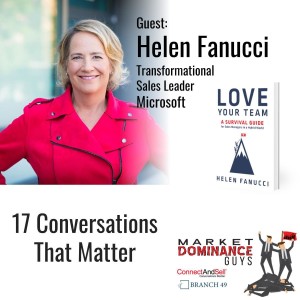
Wednesday Sep 28, 2022
EP149: 17 Conversations That Matter
Wednesday Sep 28, 2022
Wednesday Sep 28, 2022
In this scary new world of employment, where top sales talent has the power to stay with your team or leave you in the lurch, how do you hold onto that top talent? Helen Fanucci, Transformational Sales Leader at Microsoft and our guest on Market Dominance Guys, knows the answer to this question — and that answer has 17 parts. Helen has taken her 25 years of experience managing remote teams and turned that knowledge into a ground-breaking book titled, Love Your Team: A Survival Guide for Sales Managers in a Hybrid World (available on Amazon Nov. 1, 2022). In it, Helen details the 17 conversations that sales leaders must master with their team to successfully attract and retain top talent. Our podcast host, Chris Beall, questions Helen about her tried-and-true theories on why putting your sales team members first will get you the results you’re expecting. Get ready to take notes about this brave new approach to managing sales teams in today’s Market Dominance Guys’ episode, “17 Conversations That Matter.”
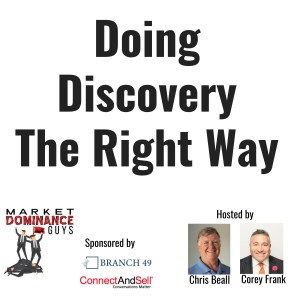
Tuesday Sep 13, 2022
EP147: Doing Discovery the Right Way
Tuesday Sep 13, 2022
Tuesday Sep 13, 2022
What are the best practices for conducting a successful discovery conversation? And how do those practices differ from having a successful cold call? On today’s Market Dominance Guys’ podcast, our hosts, Corey Frank and Chris Beall, share their insights into these two distinctly different types of sales conversations. They talk about tone, about call length, and about the practiced performance of a cold call, which has the goal of setting an appointment, versus the slower-paced, getting-to-know-you interchange of information, which has the goal of answering the question, “Does it make sense — to both parties — to proceed further?” Stay tuned to hear the advice and cautions of these two sales experts on today’s Market Dominance Guys’ episode, “Doing Discovery the Right Way.”
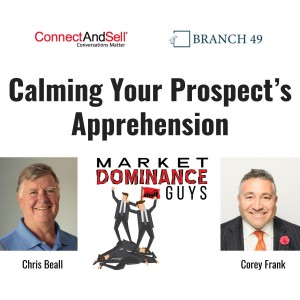
Wednesday Sep 07, 2022
EP146: Calming Your Prospect’s Apprehension
Wednesday Sep 07, 2022
Wednesday Sep 07, 2022
"Every discovery call begins with apprehension,” says Chris Beall, our Market Dominance Guys’ co-host, who is back behind the microphone after a two-month absence. Chris goes on to say that you need to be aware that starting a discovery call by interrogating your prospect only increases their apprehension. If you’re going to have a meaningful, successful conversation, you need to use a kinder, gentler approach. Chris talks with his co-host, Corey Frank, about a couple of ways he knows to take a prospect from that feeling of apprehension and fear to a feeling of pride and openness. Then, and only then, will the atmosphere of the call be right for you to ease the conversation into one of mutual discovery, where you and your prospect can learn whether their company is a fit for your product. As the title of today’s Market Dominance Guys’ podcast states, this can only happen once you’ve succeeded in “Calming Your Prospect’s Apprehension."
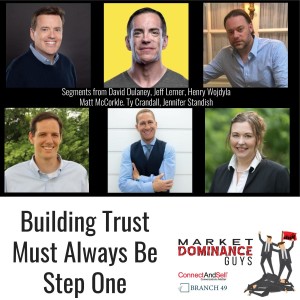
Wednesday Aug 24, 2022
EP145: Building Trust Must Always Be Step One
Wednesday Aug 24, 2022
Wednesday Aug 24, 2022
In this episode of the Market Dominance Guys, Corey and Chris agree on the importance of building trust before anything else can happen. They are joined by Transformational Coach Jennifer Standish, Henry Wojdyla, Founder and Principal at RealSource Group, Matt McCorkle, Manager of Branch Operations at Kaiser Compressors, and hosts Ty Crandall on the Business Credit and Finance Show, Jeff Lerner from Ep 150 of Millionaire Secrets, and David Dulaney on the Sales Development Podcast. The full episodes to the ones included here are listed below:
EP91: Borrowing from the Best
EP109: Being There for Your Customers
EP123: Hire Yourself a Grandma
The Business Credit and Financing Show
Sales Development Podcast https://www.spreaker.com/user/9196584/episode-164-done
MILLIONAIRE SECRET #150 Unlock Your Potential with Jeff Lerner
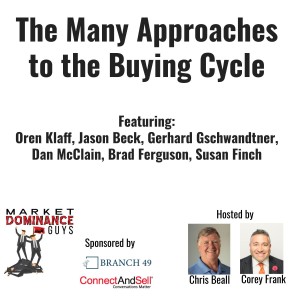
Wednesday Aug 17, 2022
EP144: The Many Approaches to the Buying Cycle
Wednesday Aug 17, 2022
Wednesday Aug 17, 2022
These sales experts agree, that there is more than one approach to a successful sales campaign. We're sure Chris Beall has some dark childhood story about alternate ways of skinning a cat, although he's never done it, of course. These discussions include modifications and redirections in the buying cycle, even though the basics are still there: awareness, consideration and decision. Join Corey and Chris in this episode of snippets from episodes about the buying cycle. This features Oren Klaff, Jason Beck, Gerhard Gschwandtner, Susan Finch, Dan McClain, Brad Ferguson, and our own Chris Beall and Corey Frank. To hear the entire episodes features, visit this collection:
https://marketdominanceguys.com/category/buying-cycle/
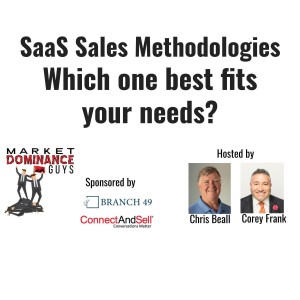
Wednesday Aug 10, 2022
EP143: SaaS Sales Methodologies - which one best fits your needs?
Wednesday Aug 10, 2022
Wednesday Aug 10, 2022
Sales methodologies are the practical, how-to “guides” that support a sales process. These actions serve as a bridge between each step of the sales cycle by keeping both the buyer's and prospect's demands in mind. In our recent episodes with Brad Ferguson, Corey and Brad discussed the Sandler method vs. Oren Klaff's Pitch method. In this quick comparison segment, Corey explains the difference between the two methods, and when one fits better than the other. What is your method to determine which sales methodology fits your company? Have you bothered to determine which to use, or are you even using one method? That's a great place to start. Corey Frank is an expert at taking companies through this process - he's done it dozens of times. Welcome to this episode of Market Dominance Guys, "SaaS Sales Methodologies - which one best fits your needs?"
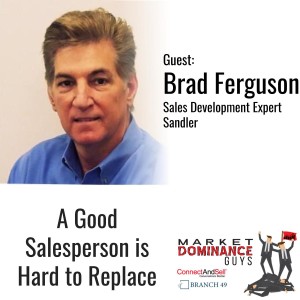
Tuesday Aug 02, 2022
EP142: A Good Salesperson Is Hard to Replace
Tuesday Aug 02, 2022
Tuesday Aug 02, 2022
Getting fired from a sales job is never a surprise. If you’re not producing, you already know it. Brad Ferguson, the managing member of Scottsdale Sales Training, has been with Sandler Training for more than 27 years, and today he shares his sales hiring, onboarding, training, and coaching expertise with our podcast host, Corey Frank. Brad believes that before you let someone go from a sales job, you need to determine whether this person can sell, and you need to consider your company’s financial investment in that individual. This includes training, coaching, and certifying, as well as their salary and benefits. Brad cautions our listeners, “Don’t let the good people you have go. Spend the time getting them up to a higher level.” If they are worth keeping, make the effort to diagnose their problems and then provide the needed training, because, as the title of this Market Dominance Guys’ episode reminds us, “A Good Salesperson Is Hard to Replace.”
About Our GuestBrad Ferguson is the CEO of Best Sales Force, Inc., an Arizona-based sales development firm. He is the Senior Sandler Training Franchisee with over 25 years of experience in the Sandler Network.